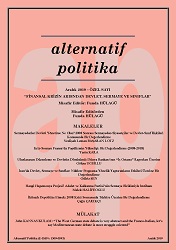İRAN’DA DEVLET, SERMAYE VE SINIFLAR: NÜKLEER PROGRAMA YÖNELİK YAPTIRIMLARIN ETKİLERİ ÜZERİNE BİR DEĞERLENDİRME
STATE, CAPITAL AND CLASSES IN IRAN: AN APPRAISAL OF THE IMPACT OF NUCLEAR SANCTIONS
Author(s): Gülriz ŞenSubject(s): Governance, Government/Political systems, International relations/trade, Security and defense, Military policy, Geopolitics, Peace and Conflict Studies
Published by: Rasim Özgür DÖNMEZ
Keywords: State; Capitalism and Classes in Iran; Sanctions Against Iran’s Nuclear Program; Historical Sociology;
Summary/Abstract: This article aims to probe the impact of nuclear sanctions upon state, capital and social classes in the Islamic Republic of Iran. It will reflect on the social dimensions of sanctions instead of the much discussed geopolitics of sanctions, which evaluate the impact of these punitive measures mainly through change or continuity in state behavior. Building on Historical Sociology’s theme of the constitution of the domestic by the international, this study will focus on the structural transformation of state-society complex through sanctions. Once elaborating on the major dynamics of state and capitalism in post-revolutionary Iran, the article will analyze the 2006-2016 period and the post-2018 era. It will discuss the economic and social repercussions of sanctions, state institutions and political factions being empowered by these policies and the impact of sanctions on the emerging discourses and search for legitimacy in domestic politics. The article finds out that nuclear sanctions fostered crony capitalism in Iran, led to militarization of state and strengthening of security actors with the rising economic might of the Revolutionary Guards. Besides, sanctions resulted in shrinking and deprivation of middle class and workers, whilst culminating in the growth of Iran’s nouveau riches. Meanwhile, the state has reproduced the post-revolutionary discourse of resistance for the economy as well in an effort to protect its legitimacy in the eyes of the deprived classes. Yet, it also relied more on coercion than consent to rule over socio-economic grievances. The article will also discuss the interaction between social and geopolitical dimensions of sanctions and stress that the geopolitics of sanctions will be determined by the social dimensions of these policies, which have resulted in restructuring of paths, actors and structures.
Journal: Alternatif Politika
- Issue Year: 11/2019
- Issue No: Special
- Page Range: 91-119
- Page Count: 29
- Language: Turkish

